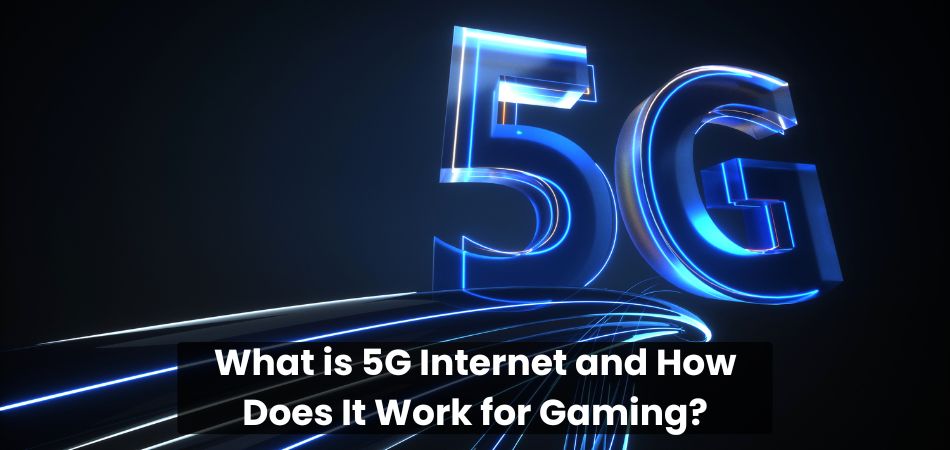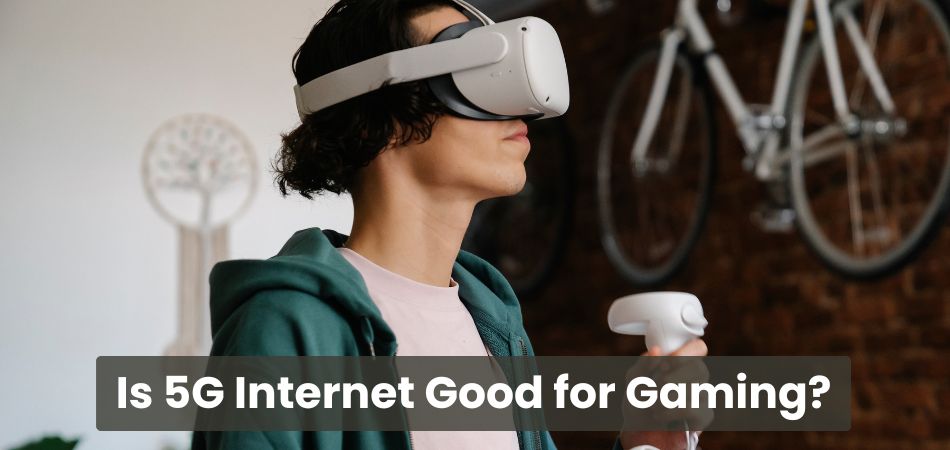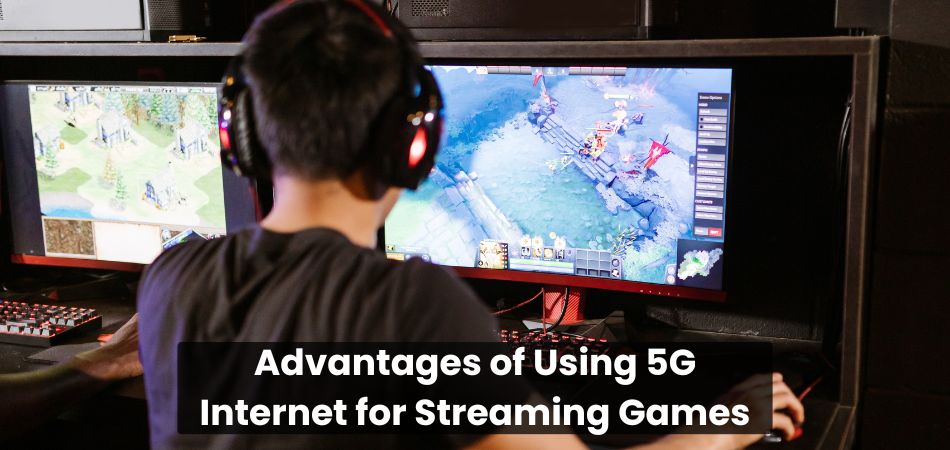Gaming has grown from a casual hobby into a highly competitive and interactive experience. With advancements in technology, the demand for faster, more reliable internet connections has skyrocketed.
Enter 5G, the next-generation network promising lightning-fast speeds and ultra-low latency. But is 5G internet good for gaming, or is it just another overhyped tech trend?
Yes, 5G internet is good for gaming, offering faster speeds, lower latency, and better support for cloud gaming. However, its performance depends on network coverage, device compatibility, and your gaming needs.
Curious if 5G can give you the edge you’ve been looking for? Read on to discover the pros, cons, and whether it’s worth upgrading for your gaming needs!
What is 5G Internet and How Does It Work for Gaming?
5G is the fifth generation of wireless network technology, designed to deliver faster speeds, lower latency, and greater capacity than its predecessors. Unlike 4G, which primarily focused on mobile connectivity, 5G aims to revolutionize how we interact with the internet, including gaming.

With speeds up to 10 times faster than 4G and latency as low as 1 millisecond, 5G has the potential to transform gaming experiences. For gamers, low latency and fast speeds are critical. Latency, the time it takes for data to travel between devices, can make or break your online gaming performance.
5G minimizes lag, ensuring smoother gameplay and quicker response times, especially for competitive multiplayer games. Its high bandwidth also supports the demands of cloud gaming, where games are streamed rather than downloaded.
The technology’s promise extends to mobile gaming, enabling seamless experiences on the go. With its potential to redefine gaming standards, 5G is a game-changer for the industry.
5G vs. 4G: What Are the Key Difference?
As technology progresses, 5G has emerged as a successor to 4G, offering significant improvements in speed, latency, and overall connectivity. While 4G laid the foundation for mobile internet, 5G is designed to meet the demands of modern applications, including gaming, streaming, and IoT. Here’s a side-by-side comparison to know the key differences:
| Feature | 4G | 5G |
| Speed | Up to 100 Mbps | Up to 10 Gbps |
| Latency | 30-50 milliseconds | As low as 1 millisecond |
| Bandwidth | Limited, struggles with high demand | Higher, supports more devices seamlessly |
| Energy Efficiency | Moderate | More energy-efficient for connected devices |
| Application | Suitable for browsing, streaming, and basic gaming | Ideal for cloud gaming, VR/AR, and smart technologies |
Is 5G Internet Good for Gaming?
5G Internet brings revolutionary advancements in speed, latency, and reliability, making it a promising choice for gaming enthusiasts. With download speeds up to 10 Gbps and latency as low as 1 millisecond, 5G eliminates common gaming frustrations like lag and delays. Whether you’re playing high-performance online games or exploring engaging virtual worlds, 5G provides the seamless performance modern gaming demands.

For competitive gamers, low latency is a game-changer. Real-time responsiveness can determine victory or defeat in multiplayer battles. 5G’s ultra-low latency ensures that commands are executed instantly, giving players a significant edge.
Additionally, 5G’s high bandwidth supports cloud gaming, allowing players to stream high-quality games without the need for expensive hardware, making gaming accessible to a broader audience.
However, 5G’s performance depends on network coverage and infrastructure, which are still developing in many areas. While it offers outstanding potential for gaming, factors like signal stability and cost need consideration. To truly harness its benefits, gamers should weigh their location and gaming preferences before making the switch.
How Network Coverage Affects 5G Gaming Performance?
Network coverage plays a crucial role in determining the effectiveness of 5G for gaming. While 5G offers ultra-fast speeds and low latency, its performance heavily relies on the strength and availability of the network in your area. Gamers in urban regions with dense 5G infrastructure often experience smoother gameplay compared to those in rural or underdeveloped areas with patchy coverage.
A strong 5G signal ensures stable connections, reducing latency and minimizing interruptions during gameplay. This is especially critical for competitive gaming, where even milliseconds of delay can impact performance. However, areas with weak 5G signals may experience inconsistent speeds, frequent disconnects, and higher ping rates, negating the advantages 5G is designed to provide.
Additionally, 5G networks use different frequency bands, such as low-band, mid-band, and high-band (mmWave), each with varying coverage and performance. While high-band delivers the fastest speeds, its limited range can lead to coverage gaps. For gamers, knowing local 5G availability is key to maximizing performance and enjoying the full potential of this advanced technology.
Advantages of Using 5G Internet for Streaming Games
Streaming games is a bandwidth-intensive activity that requires a stable and fast internet connection. 5G technology revolutionizes this experience with maximum speed, minimal latency, and smooth connectivity. Here are the top advantages of using 5G for streaming games:

Ultra-Fast Download and Upload Speeds
5G offers download speeds up to 10 Gbps, significantly higher than traditional connections. This allows gamers to stream high-resolution games with minimal buffering. Faster upload speeds also improve the responsiveness of game streams, improving real-time gameplay. With 5G, even large game updates can be downloaded in minutes, making the experience hassle-free.
Reduced Latency for Smoother Gameplay
Latency in gaming refers to the delay between input and action on screen. 5G minimizes this delay to as low as 1 millisecond, ensuring near-instant responsiveness. For competitive and cloud gaming, this means fewer disruptions and more precise control. Reduced latency increases gameplay fluidity, even in graphically demanding titles.
Support for High-Resolution Graphics
5G enables streaming games in 4K or even 8K resolution without compromising performance. Its high bandwidth supports the data-intensive nature of ultra-high-definition gaming. This means gamers can enjoy visually stunning graphics without lag or stuttering. For VR and AR games, 5G ensures a fully immersive experience.
Smooth Cloud Gaming Integration
Cloud gaming relies on high-speed internet to deliver games directly from servers to players. 5G’s robust connectivity makes this possible without requiring expensive gaming hardware. Gamers can stream AAA titles on smartphones, tablets, or other devices effortlessly. This accessibility makes gaming more inclusive and convenient for users worldwide.
Better Mobility for Gaming on the Go
Unlike wired connections, 5G allows gamers to stream games anywhere within the network’s coverage. This freedom is ideal for mobile gamers and those who frequently travel. Whether at home, in a park, or on a train, 5G ensures consistent gaming performance. Gamers no longer have to compromise on quality when gaming outside.
Improved Multiplayer Experiences
Multiplayer games require fast and stable connections to synchronize multiple players in real time. With 5G, lag and delays are drastically reduced, creating a level playing field for all participants. This technology also supports larger multiplayer environments, enhancing overall game dynamics. The result is a more engaging and competitive gaming experience.
Should You Switch to 5G for an Enhanced Gaming Setup?
Switching to 5G for gaming offers significant advantages, including faster speeds and ultra-low latency. For gamers, these features mean reduced lag, smoother gameplay, and an edge in competitive settings. If you’re into cloud gaming or multiplayer titles, 5G’s high bandwidth ensures stable performance, even in demanding scenarios.
However, whether you should switch depends on your location and gaming preferences. While 5G excels in areas with strong network coverage, its performance may falter in rural or underdeveloped regions.
Additionally, the cost of upgrading to a 5G-compatible device and plan may not justify the benefits for casual gamers who already enjoy stable broadband connections.
So, 5G is a game-changer for mobile and cloud-based gaming, offering amazing flexibility and performance. If you prioritize superior technology and seamless experiences, making the switch could be worth it. Consider both your needs and local 5G availability to decide if it’s the right move for your gaming setup.
FAQs About 5G Internet for Gaming
While 5G promises exciting advancements for gamers, many people have questions about its practical use and implications. From compatibility concerns to data usage, knowing how 5G fits into your gaming lifestyle is key. Here are five frequently asked questions to help you make informed decisions:
1. Does 5G Work With All Gaming Devices?
Not all gaming devices are 5G-compatible; you’ll need hardware that supports 5G connectivity. Most modern smartphones, tablets, and some routers are equipped for 5G, but consoles like the PlayStation or Xbox still rely on Wi-Fi. You can use a 5G hotspot to connect older devices to the network.
2. Is 5G Gaming Secure?
5G networks use advanced encryption protocols to enhance security. However, as with any internet connection, users should remain cautious about phishing, malware, and unsecured networks. Using a VPN and keeping devices updated can further safeguard your gaming sessions.
3. How Much Data Does 5G Gaming Consume?
Gaming on 5G consumes significant data, especially for high-resolution streaming or multiplayer titles. On average, online gaming can use 40-300 MB per hour, but streaming in 4K can spike usage dramatically. Gamers should monitor their data plans to avoid unexpected overage charges.
4. Does Weather Affect 5G Gaming Performance?
Extreme weather, like heavy rain or snow, can sometimes impact 5G signals, especially with high-frequency mmWave bands. These disruptions are typically brief but may reduce speeds or connectivity during intense storms. Gamers in areas with frequent severe weather should consider this when relying on 5G.
5. Can 5G Support VR and AR Gaming?
Yes, 5G is ideal for VR and AR gaming due to its high bandwidth and low latency. It enables seamless interactions and real-time tracking, which are crucial for immersive experiences. This makes it a powerful tool for both casual VR gaming and professional AR applications.
Final Thoughts
The arrival of 5G has opened new doors for gamers, offering unprecedented speed, low latency, and the flexibility to game on the go. Whether you’re a competitive player seeking real-time precision or a casual gamer exploring cloud-based titles, 5G can improve your experience.
But is 5G internet good for gaming? The answer depends on your location, device compatibility, and gaming preferences. While it delivers significant advantages, factors like network coverage and data costs must be considered. So, 5G is a promising leap forward, making it a worthy investment for those seeking better gaming performance.
